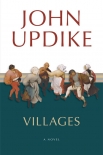Villages, John Updike [brene brown rising strong .TXT] 📗

- Author: John Updike
Book online «Villages, John Updike [brene brown rising strong .TXT] 📗». Author John Updike
The village, so-called, of Haskells Crossing awakens around their private hill; the steady dull whir of traffic presses through the pine and plaster house walls and the insulating woods beyond. The newspapers—the Boston Globe for him, the New York Times for her—have already been delivered. Birds long have been astir, the robins picking after worms, the crows boring into the lawn for chinch-bug grubs, the swallows snatching mosquitoes from midair, kind calling to kind in their jubilant pea-brained codes. He shouts down the stairs on his way to the bathroom, “Good morning, Julia!”
Her cry returns: “Owen! You’re up!”
“Sweetie, of course I’m up; my goodness, it’s after seven o’clock.”
The older they get, the more they talk like children. Her voice comes up the stairs, lightly arguing, semi-teasing: “You always sleep to eight, now that you have no train to catch.”
“Darling, what a liar you are! I never sleep past seven; I wish I could,” he goes on, though uncertain if she has moved away from the stairs and can’t hear him, “but that’s one of the things of old age, you’re up with the birds. Wait until it hits you.”
This is connubial nonsense: talk about pea-brained codes. If the day were a computer, he thinks, this is how it boots up, reloading main memory. Julia in fact sleeps less than he (as did his first wife, Phyllis), but her being five years younger has always been for him a source of pride and sexual stimulus, like the sight of her toes at the front of her blue flip-flops. He also likes to see, below her bathrobe, her pink heels as they retreat, the vertical strokes of her Achilles tendons alternating, one quick firm step after the other, her feet splayed outward in the female way.
They hold this conversation while he waits, his bladder aching, outside the door to his bathroom, beside the stairs that descend to the kitchen. The image of his beloved Julia lying naked and dead in his dream, and the dream sensation of guilt that made her suicide in reality a murder committed by him, are still more vivid than the daily waking facts—the wallpaper with its sepia roses and muted metallic gloss, the new hall carpet with its fresh beige nap and thick, springy undercarpet, the day ahead with its hours to climb like rungs on an ancient, dangerous, splintering ladder.
While Owen shaves at the mirror mounted by the window, where his pouchy and sun-damaged old face, cruelly magnified, frontally accepts the pitiless light, he hears the mockingbird, mounted on its favorite perch at the tip of the tallest cedar, deliver a thrilling long scolding about something or other, some minor, chronic procedural matter. All these local levels of Nature—the birds, the insects, the flowers, the furtive fauna of chipmunks and woodchucks scuttling in and out of their holes as if a shotgun might blast them the next instant—have their own network of concerns and communications; the human world to them is merely a marginal flurry, an inscrutable static, an intermittent interference rarely lethal and bearing no perceived relation to the organic bounty (the garbage, the gardens) that the human species brings to Nature’s table. They snub us, Owen thinks. We should be gods to them, but they lack our capacity for worship—for foresight and the terrors and convoluted mental grovelling that foresight brings with it, including the invention of an afterlife. Animals do not distinguish between us and the other beasts, or between us and the rocks and trees, each with its pungence and relevance to the struggle for existence. The earth offers haven to scorpions and woodchucks and quintillions of ants; the stars guide the Canada geese and arctic terns, the barn swallows and monarch butterflies in their immense annual migrations. We are mere dots beneath their wings, our cities foul and barren interruptions in the discourse of predator and prey. No, not interruptions, for many species accept our cities as habitats, not just the rats in the cellar and the bats in the attic but the hawks and pigeons on the skyscraper ledges and now the deer brazenly, helplessly stalking through suburban back yards, both pets and pests.
Owen stiffens his lower lip to take the razor’s ticklish sideways scrape. He tries to shave without seeing his face, which has never been exactly the face he wanted—too much nose, not enough chin. An inviting weakness, and yet a sharp-eyed wariness. Lately, creases drag at the corners of his mouth, and the eyelids are wrinkled like a desert reptile’s, so that their folds snag and weigh on his lashes in the morning. He hates that familiar feeling of something in his eye, elusive but bothersome. Pollen. An eyelash. A burst capillary. Behind him, through the insulating woods, the sounds of engines, of backfiring, and of backing trucks’ warning beep, make felt the skimpy commercial section, a block or two long, of Haskells Crossing; it is audible but not visible from his house in its leafy hilltop concealment. Though he can see the lights of the town clearly from his upstairs windows, he has never found a spot in town from which his house is visible. That pleases him; it is like his consciousness, invisible but central.
As a child he assumed that somehow the world was set in motion by his awaking. What happened before he awoke was like the time before he was born, a void he could not contemplate. It always surprises him how early, in villages as well as cities, morning activity begins, not just among fabled worm-catching birds but among men—the commuter hastening to catch the 6:11 train, the owner of the fruit store in town already back with his truck from the open market near the Callahan Tunnel, the jogging young





Comments (0)